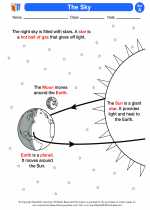Fossil Records
Fossil records are the remains or traces of ancient life that have been preserved in the Earth's crust. These remains provide valuable information about the history of life on Earth and how organisms have evolved over time.
Types of Fossils
There are several types of fossils, including:
- Body Fossils: These are the actual remains of an organism, such as bones, teeth, or shells.
- Trace Fossils: These are evidence of an organism's activity, such as footprints, burrows, or nests.
- Molds and Casts: These are formed when an organism's remains are buried in sediment and leave an impression that later hardens into rock.
Formation of Fossils
Fossils are formed through a process called fossilization. This occurs when an organism's remains are buried in sediment and undergo a series of chemical and physical changes over time. The most common method of fossilization is through the gradual replacement of organic material with minerals, resulting in a fossilized replica of the original organism.
Uses of Fossil Records
Fossil records are important for several reasons:
- They provide evidence of past life forms and how they have changed over time.
- They help us understand the history of the Earth and the environmental conditions that existed in the past.
- They contribute to our understanding of evolution and the relationships between different species.
- They can be used to date rock layers and determine the relative ages of different geological formations.
Study Guide
Here are some key points to remember when studying fossil records:
- What are the different types of fossils?
- How are fossils formed?
- Why are fossil records important?
- What information can we learn from studying fossil records?
- How do scientists use fossil records to understand the history of life on Earth?
Remember to review the different types of fossils, the process of fossilization, and the significance of fossil records in understanding the history of life on Earth.
Understanding fossil records can provide valuable insights into the history of life on Earth and the processes of evolution. It is an important topic in the study of paleontology and the Earth sciences.
[Fossil Records] Related Worksheets and Study Guides:
.◂Science Worksheets and Study Guides First Grade. The Sky

 Activity Lesson
Activity Lesson
 Worksheet/Answer key
Worksheet/Answer key
 Worksheet/Answer key
Worksheet/Answer key
 Worksheet/Answer key
Worksheet/Answer key
 Worksheet/Answer key
Worksheet/Answer key
 Vocabulary/Answer key
Vocabulary/Answer key
